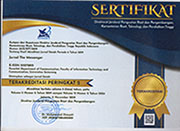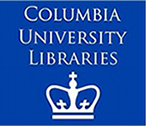Information about Electronic Governance: A Tool to Curb Corruption in Nigeria
Abstract
Keywords
Full Text:
PDFReferences
Adeyemo, A. B. (2013). E-government implementation in Nigeria: An assessment of Nigeria s global e-government ranking. Journal of Internet and Information System, 2(1), 11 19.
Augustine, O. E., Sebastine, A. O., & Oliver, H. M. (2015). E-Governance and Corruption in Nigeria. International Journal of Multidisciplinary Research and Development, 2(8), 640 645.
Bhatnagar, S. (2003). Transparency and Corruption: Does E-government help? Draft paper for the compilation of CHRI 2003 Report OPEN SESAME: looking for the Right to Information in the Commonwealth. Commonwealth Human Rights Initiative.
Dahida, D. P., & Akangbe, O. M. (2013). Corruption as a Bane for Under-Development in Nigeria: Issues and Challenges. International Affairs and Global Strategy, 15(2).
Danfulani, J. (2013). E-governance: A weapon for the fight against Corruption in Nigeria. Sahara.
Davies, T., & Fumega, S. (2014). Anti-Corruption Resource Centre. Anti-Corruption Resource Centre, 4(4), 43 48.
Editorial. (2007, February). This Day Newspaper Editorial. This Day Newspaper.
Ekomwenrenren, I., & Ekuobase, G. (2015). Curbing Corruption in Nigeria Using Service Innovation. A Multidisciplinary Journal Publication of the Faculty of Science, Adeleke University, 2(2), 103 114.
Heeks, R. (2004). E-Government for Development Transparency Definitions Page. Retrieved February 2, 2018, from www.egov4dev.org.
Ifinedo, P., & Uwadia, C. (2005). Towards E-governance in Nigeria: Shortcomings, Successes, Swish or Sink. In Proceedings of the International Federation of Information Processing (IFIP) WG 9.4 Conference (pp. 75 86). Abuja, Nigeria.
Nageri, K. I., Gunu, U., & Abdul, F. A. (2013). Corruption an Economic Development: Evidence from Nigeria. Kuwait Chapter of Arabian Journal of Business and Management Review, 3(2), 118 123.
Ndou, V. (2004). E-government for developing Countries: Opportunities and Challenges. The Electronic Journal on Information Systems in Developing Countries, 18(1), 1 24.
Nwankwo, O. F. (2014). Impact of Corruption on Economic Growth in Nigeria. Mediterranean Journal of Social Sciences, 5(6), 165 169.
Ogunro, K. V., & Tolu, L. (2012). Combating Corruption in Nigeria. International Journal of Academic Research in Economics and Management Sciences, 1(4), 226 244.
Oye, N. D. (2013). Reducing Corruption in African Developing Countries: The Relevance of E-Governance. Greener Journal of Social Sciences, 3(1), 006-013.
Shatne, K. (2001). Constituent Relationship Management Systems: A Primer for Public Managers. Government Finance Review, 17(2).
Symonds, M. (2000). Government and the Internet: The Next Revolution. Economist, 355(8176).
World Bank. (1997). World Development Report 1997. Retrieved February 2, 2018, from http://web.worldbank.org
DOI: http://dx.doi.org/10.26623/themessenger.v10i2.874
Refbacks
- There are currently no refbacks.
Copyright (c) 2018 Jurnal The Messenger
View My Stats [Jurnal The Messenger] is an International Scientific Journal, Published by the Department of Communication, Faculty of Information Technology and Communication, Universitas Semarang (Central Java, Indonesia). It is licensed under a Creative Commons Attribution 4.0 International License.



_11.jpg)




_BARCODE.jpg)
_BARCODE1.jpg)


5.png)










2.png)





